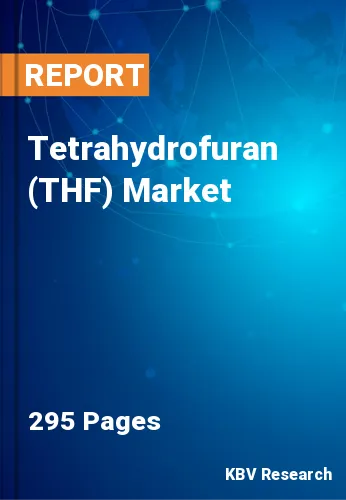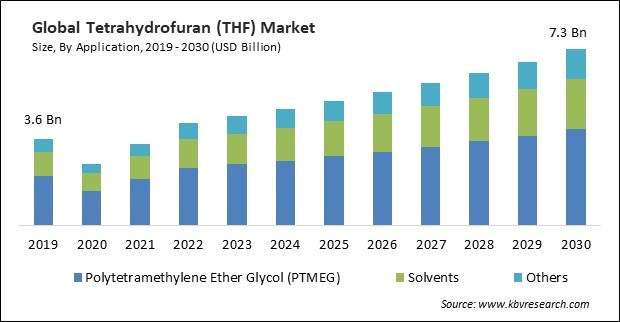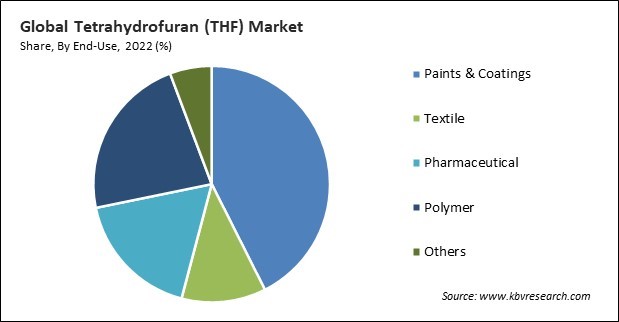
The Global Tetrahydrofuran (THF) Market size is expected to reach $7.3 billion by 2030, rising at a market growth of 7.1% CAGR during the forecast period. In the year 2022, the market attained a volume of 1,670.66 Kilo Tonnes experiencing a growth of 6.0% (2019-2022).
The adhesives and sealants industry in North America has witnessed growth, and THF is utilized in the formulation of adhesives due to its solvency properties. Therefore, North America segment generated $962.9 million revenue in the market in 2022. As North America focuses on renewable energy sources and electronics production, the demand for THF in these sectors is expected to rise, contributing to market regional expansion. The North America region acquired a significant revenue share in the market. Some of the factors impacting the market are growth in the electronics industry, expansion of the construction sector and raw material price volatility.

THF is employed in the electronics industry to produce coatings, adhesives, and other materials. The increasing demand for electronic devices, along with technological advancements, drives the growth of the THF. THF is utilized in the production of coatings for electronic components. These coatings protect against environmental factors, moisture, and corrosion. As the demand for electronic devices continues to rise, the use of THF in the formulation of protective coatings expands. Polyurethane foams, produced using THF, find applications in the electronics industry for insulation and cushioning. Additionally, the construction industry is a significant consumer of THF, using it to produce various materials such as coatings, adhesives, and sealants. The global expansion of construction and infrastructure development projects is a factor in the rising demand for THF. THF is a key component in producing polyurethane foams used for insulation purposes in construction. The insulation materials contribute to energy efficiency by providing thermal insulation in buildings. These coatings enhance construction materials' durability, weather resistance, and aesthetic appeal. The growth in construction activities leads to an increased use of THF in coatings. Therefore, adopting innovative display technologies in electronic devices further supports the growth of the market and expansion of the construction sector have been a pivotal factor in driving the growth of the market.
However, Volatility in raw material prices can lead to supply chain disruptions. Manufacturers may face challenges in securing a stable and cost-effective supply of raw materials, leading to potential delays in production and distribution. Managing and mitigating the risks associated with raw material price volatility requires effective risk management strategies. Companies may need to invest in financial instruments, such as hedging, to offset the impact of price fluctuations, adding complexity to their operations. Raw material price volatility is a significant challenge that hampers the growth of the market.
Based on end-use, the market is classified into textile, pharmaceutical, paints & coatings, polymer and others. The polymer segment acquired a substantial revenue share in the market in 2022. Tetrahydrofuran serves as a versatile solvent in the polymer segment. It is particularly effective in dissolving polyvinyl chloride (PVC) and polyurethane, essential components in producing a wide range of plastics. As the polymer industry expands, the demand for solvents like THF increases to support various polymerization and processing steps. With an increasing emphasis on sustainability, there is a growing demand for biodegradable polymers. Tetrahydrofuran is involved in synthesizing certain biodegradable polymers, contributing to the expansion of this segment.

By application, the market is categorized into polytetramethylene ether glycol (PTMEG), solvents, and others. In 2022, the polytetramethylene ether glycol (PTMEG)segment held the highest revenue share in the market. A crucial raw material in the production of polyurethanes, which have numerous applications, including flexible and rigid foams, elastomers, and coatings, is the polytetramethylene ether glycol (PTMEG) segment. The synthesis of PTMEG involves the polymerization of tetrahydrofuran, establishing a direct link between the two. Polyurethane-based products, including those produced with PTMEG and THF, find applications in insulation, sealants, adhesives, and coatings. The expansion of the construction industry directly influences the demand for THF due to its role in the production of PTMEG, which is used in the synthesis of polyurethane materials.
| Report Attribute | Details |
|---|---|
| Market size value in 2022 | USD 4.2 Billion |
| Market size forecast in 2030 | USD 7.3 Billion |
| Base Year | 2022 |
| Historical Period | 2019 to 2021 |
| Forecast Period | 2023 to 2030 |
| Revenue Growth Rate | CAGR of 7.1% from 2023 to 2030 |
| Number of Pages | 295 |
| Number of Table | 550 |
| Quantitative Data | Volume in Kilo Tonnes, Revenue in USD Billion, and CAGR from 2019 to 2030 |
| Report coverage | Market Trends, Revenue Estimation and Forecast, Segmentation Analysis, Regional and Country Breakdown, Porter’s 5 Forces Analysis, Company Profiling, Companies Strategic Developments, SWOT Analysis, Winning Imperatives |
| Segments covered | Application, End-Use, Region |
| Country scope |
|
| Companies Included | Mitsubishi Chemical Holdings Corporation, BASF SE, Honeywell International, Inc., Univar Solutions, Inc., Toray Industries, Inc., Ashland Inc. (Ashland Global Holdings Inc.), Merck KGaA, LyondellBasell Industries Holdings B.V., Eastman Chemical Company, and Tokyo Chemical Industry Co. Ltd |
| Growth Drivers |
|
| Restraints |
|
Region-wise, the market is analysed across North America, Europe, Asia Pacific, and LAMEA. In 2022, the Asia Pacific region led the market by generating the highest revenue share. Rapid urbanization and industrialization have occurred in Asia, especially in China and India. The Asia Pacific region, home to one of the largest manufacturing bases for plastics and polymers, contributes significantly to the increasing adoption of THF.
Free Valuable Insights: The Global Tetrahydrofuran (THF) Market size to reach USD 7.3 Billion by 2030
The market research report covers the analysis of key stake holders of the market. Key companies profiled in the report include Mitsubishi Chemical Holdings Corporation, BASF SE, Honeywell International, Inc., Univar Solutions, Inc., Toray Industries, Inc., Ashland Inc. (Ashland Global Holdings Inc.), Merck KGaA, LyondellBasell Industries Holdings B.V., Eastman Chemical Company, and Tokyo Chemical Industry Co. Ltd.
By End-Use (Volume, Kilo Tonnes, USD Billion, 2019-2030)
By Application (Volume, Kilo Tonnes, USD Billion, 2019-2030)
By Geography (Volume, Kilo Tonnes, USD Billion, 2019-2030)
This Market size is expected to reach $7.3 billion by 2030.
Growth in the electronics industry are driving the Market in coming years, however, Raw material price volatility restraints the growth of the Market.
Mitsubishi Chemical Holdings Corporation, BASF SE, Honeywell International, Inc., Univar Solutions, Inc., Toray Industries, Inc., Ashland Inc. (Ashland Global Holdings Inc.), Merck KGaA, LyondellBasell Industries Holdings B.V., Eastman Chemical Company, and Tokyo Chemical Industry Co. Ltd.
In the year 2022, the market attained a volume of 1,670.66 Kilo Tonnes experiencing a growth of 6.0% (2019-2022).
The Paints & Coatings segment is generating highest revenue in the Market, by End-Use in 2022; thereby, achieving a market value of $3 Billion by 2030.
The Asia Pacific region dominated the Market, by region in 2022, and would continue to be a dominant market till 2030; thereby, achieving a market value of $3.6 Billion by 2030.
Our team of dedicated experts can provide you with attractive expansion opportunities for your business.
